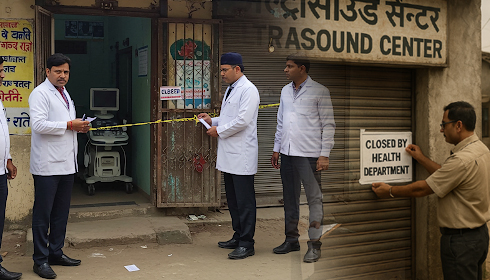
Bihar Health Department Cracks Down on Fake Clinics
A recent raid conducted by the health department in Bakhri has raised significant concerns among unregistered medical practitioners, as authorities escalate their initiatives to address illegal healthcare operations. Reports from local media indicate that an operation carried out under the directives of the District Magistrate (DM) focused on four unauthorised clinics and diagnostic centres. This initiative revealed a significant network of fraudulent healthcare providers taking advantage of vulnerable patients. The enforcement actions have not only interrupted these illegal operations but have also increased vigilance among the operators of such establishments, many of whom are now exercising heightened caution.
Local news outlets report that the raid was led by Dr Deepak Kumar, the in-charge medical officer of Bakhri Primary Health Centre (PHC), in collaboration with a team of health officials. The investigation uncovered a significant finding: among the numerous clinics, ultrasound centres, pathology labs, and X-ray facilities in Bakhri, only two were identified as legally registered. During the operation, we discovered two clinics closed, while an ultrasound centre and a nursing home remained open but notably lacked patients or staff. Dr. Kumar highlighted that the campaign is ongoing, with plans to broaden the examination to include all unregistered clinics, ultrasound centres, and pathology labs in the region. “We have initiated the process of identifying and inspecting these facilities, and the effort will persist to ensure compliance,” he said while speaking to local reporters.
Local media further reported that most of these establishments do not have proper registration and are operating in violation of medical regulations. Viewed as a significant measure, the health department's actions aim to address the exploitative ecosystem that has persisted due to inadequate oversight.
The health department is advancing its efforts to achieve a tuberculosis (TB)-free district, in accordance with the vision of Prime Minister Narendra Modi for a TB-free India, alongside the ongoing enforcement drive. Local sources indicate that there are currently 1,940 tuberculosis patients receiving free treatment in the district. The average treatment duration ranges from six to nine months, which has been shown to be effective in curing the disease. The central government has raised the monthly nutritional aid for TB patients from ₹500 to ₹1,000, effective November 2024. This adjustment has already benefitted 700 patients, while additional individuals are in the process of receiving the revised amount. As of January 2025, the department has conducted screenings for 6,350 individuals, resulting in the identification of 1,084 new cases of tuberculosis.
The district has enhanced its diagnostic capabilities by substituting manual testing with advanced kits at primary and community health centres. Truenat machines, recently installed in hospitals, provide TB test results in a two-hour timeframe, facilitating timely treatment. Testing and treatment services are provided at all Primary Health Centres (PHCs), Community Health Centres (CHCs), referral hospitals, as well as sub-divisional and district hospitals, at no cost. Dr. R.K. Chaudhary, District Immunisation Officer and acting District TB Officer, emphasised the department’s dedication: “We are implementing specific measures to achieve a TB-free district.” Testing has increased significantly, and complimentary services are now available at all health facilities. The health department's strategy involves addressing the issue of fraudulent clinics while simultaneously promoting tuberculosis eradication, reflecting a significant initiative aimed at protecting public health. The existence of unregistered clinics highlights significant shortcomings in regulatory oversight, prompting enquiries into the conditions that allowed these operations to thrive without scrutiny. Consistent measures and enhanced enforcement are essential to safeguard at-risk communities from exploitation and to support the effectiveness of national health initiatives.